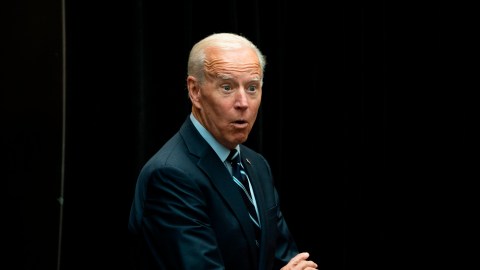Can’t shake your student debt? Thank Joe Biden’s votes.

JOHANNES EISELE/AFP/Getty Images
- Student loan debt in the United States is at crisis levels, as more than a trillion dollars is currently held.
- Part of the reason the amount is so high is because student loans can’t be easily shaken off through bankruptcy proceedings.
- This is, at least partly, the fault of a certain Delaware Senator who later served as our coolest Vice President.
Student loan debt in the United States is at crisis levels — about $1.5 trillion worth of the stuff is weighing down the economy and now constitutes the second-largest source of debt in the country, just behind mortgage debt. These facts make it no wonder why several of the leading candidates for president this time around have given attention to the issue.
The current leading candidate for the Democratic nomination, Joe Biden, has yet to release a major plan, though. This is curious, as his record suggests that at least some of this crisis is the result of his own voting record.
Say it ain’t so Uncle Joe!
Joe Biden’s career in the senate has included one too many detours into making student loan debt harder to get rid of than can be ignored.
In 1978 he co-wrote a bill that introduced the first limit on how students could use bankruptcy law to reduce their debt burden. The bill was widely seen as unnecessary by consumer advocate groups; it passed anyway. It’s restrictions, most notably the imposition of a minimum length of time students had to wait between getting out of college and declaring bankruptcy on their student loans, were slowly extended to other loans; such as those for vocational schools.
In 1990 he helped author the Crime Control Act, which is famous for stepping up sentencing guidelines, included an entirely unrelated clause that further lengthened the time students had to wait before they could declare bankruptcy on their student loans.
Then came 1997, when a panel appointed by President Clinton reported that these limitations were still pointless and advised that Congress should reverse all of them. Instead, Congress, with Uncle Joe publicly expressing his support, went the other way. In 1998 they introduced an “undue hardship” clause to federal student loan bankruptcy proceedings; making it even more difficult to declare bankruptcy on student debt even if you waited long enough to be able to do it.
To top all of this off, he supported adding the undue hardship clause to private student loans in 2005 which earned him the ire of a young Harvard professor named Elizabeth Warren.
All of these bills make student loans harder to get rid of than other kinds of debt. Some of Biden’s votes might have been motivated by his being the senator from Delaware, the land where all the credit cards and provide lenders are from. The businesses in his state stood to make a fair amount of money as a result of these bills, even if the people there were still just as debt-ridden as the rest of us, if not more so.
Now, the Biden campaign has declared its support for streamlining the process for the Public Service Loan Forgiveness Program and made vague claims in favor of “16 years of free public education.” Both of these are policies that enjoy some political support and would, if enacted, make some difference to millions of Americans with or soon to have student loan debt.
However, given that these declarations are vague, tepid, and comparatively minor, these past votes must be seen as at least partially indicative of what direction a Biden administration would take in handling the student loan debt crisis.
It’s still early though; he may well release a plan next week that outdoes anything else on the table. Take all of this with a healthy grain of salt — but remember that too much salt is bad for you.





